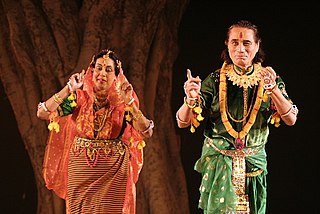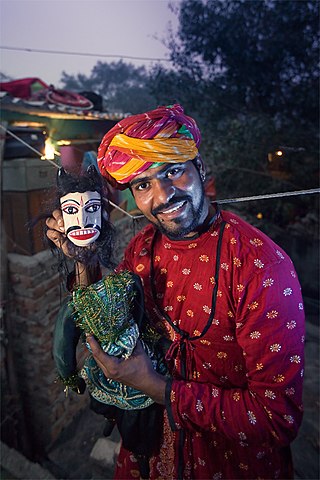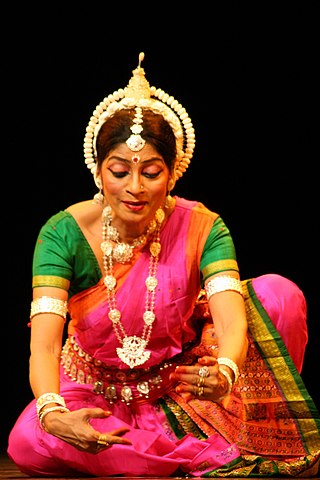
Sangeet Natak Akademi is the national level academy for performing arts set up by the Government of India.

Vasantrao Deshpande was a Hindustani classical vocalist renowned for his contribution to Natya Sangeet.

Dadi Pudumjee is a leading puppeteer in India and he is the founder of The Ishara Puppet Theatre Trust. He was awarded the Sangeet Natak Akademi Award in 1992.

Kathputli is a string puppet theatre, native to Rajasthan, India, and is the most popular form of Indian puppetry. Being a string marionette, it is controlled by a single string that passes it from the top of the puppet over the puppeteers.
Ratan Thiyam is an Indian playwright and theatre director, and the winner of Sangeet Natak Akademi Award in 1987, one of leading figures of the "theatre of roots" movement in Indian theatre, which started in the 1970s. Also known as Thiyam Nemai, Ratan Thiyam is known for writing and staging plays that use ancient Indian theatre traditions and forms in a contemporary context. A former painter, and proficient in direction, design, script and music, Thiyam is often considered one of leading contemporary theatre gurus.

Devi Lal Samar was an Indian puppeteer who was the founder-director of a folk-theatre museum called the Bharatiya Lok Kala Mandal in Udaipur, Rajasthan. He was awarded Padma Shri for his outstanding work. He wrote several books in Hindi about Rajasthani theatre and puppetry.
The Sangeet Natak Akademi Fellowship, also known as Akademi Ratna Sadasyata, is an Indian honour for the performing arts presented by Sangeet Natak Akademi. It is "the most prestigious and rare honour" conferred by the Akademi and is "restricted to 40 individuals at any given time".

Rajkumar Singhajit Singh, is a leading exponent, choreographer and a guru of Indian classical dance form of Manipuri, including the Pung cholom and Raslila. He was awarded with the Sangeet Natak Akademi Award in 1984 and the Padma Shri in 1986 for his contribution to the Manipuri dance. In the year 2011, Sangeet Natak Akademi, India's The National Academy for Music, Dance and Drama, awarded him with its highest award, the Sangeet Natak Akademi Fellowship for his contribution to Indian Dance. In 2014 he was also conferred with the Tagore Award.

Ustad Sabri Khan was an Indian sarangi player, who was descended on both sides of his family from a line of distinguished musicians.

Shriram Bharatiya Kala Kendra (SBKK) is an Indian cultural institution which runs a school for music, dance and performing arts in New Delhi. It was founded by Sumitra Charat Ram in 1952, and imparts training in Indian classical dance styles and music, including Kathak, Bharatanatyam, Odissi, Chhau, Hindustani Classical music, both Vocal and Instrumental. Its associated organisation is the Shri Ram Centre for Performing Arts at Safdar Hasmi Marg, in the Mandi House area, the cultural hub of Delhi, the centre includes a theater for the performing arts, a theatre repertory company and an acting school.
Sundari K. Shridharani was the founder and director of Triveni Kala Sangam, a multi-arts institution, which she established in 1950.

Shanno Khurana is an Indian classical vocalist and composer, from the Rampur-Sahaswan gharana of Hindustani classical music. A disciple of the doyen of the gharana, Ustad Mushtaq Hussain Khan, she is known for performing rare bandish and raag, though her singing style includes genres like khayal, tarana, thumri, dadra, tappa, to chaiti and bhajan. Born and brought up in Jodhpur, she started singing on All India Radio in 1945 in Lahore, later shifted to Delhi, where she continued her singing on All India Radio, Delhi and in concerts and music festivals. She also pursued music education, finally earning her M.Phil. and PhD in music from the Kairagarh University, and has undertakes extensive research on folk music of Rajasthan.
Tapas Sen was a noted Indian stage lighting designer, who was an important figure in 20th-century Indian theatre. He started working with Bengali theatre movement in Kolkata in the late 1940s, along with noted directors, Utpal Dutt and Shambhu Mitra. Later he became a founding member of the Indian People's Theatre Association's (IPTA), Delhi chapter, and worked closely with Hindi theatre. Through his career stretching five decades he worked theatre directors, Ebrahim Alkazi, Vijay Tendulkar, and also dancers Sadhana Bose, Chandralekha, Birju Maharaj and Kelucharan Mahapatra. He was known not only for his creative stage lighting, but also had a significant impact on the work of leading theatre director of the time.

Sakhi kandhei is a string puppetry show popular in the Indian state of Odisha, especially in the Kendrapara district of Odisha. This form of art is still performed by local artists in and around Palakana, a small village in Kendrapara. Puppeteers generally form groups and travel from village to village for performing shows. Wooden dolls are tied to strings which are controlled by pulling and releasing the strings. Different expression by pulling the strings narrate tales from the Puranas and modern social life. A group of artists perform music and give background voice for the narration of stories.

Kathputli Colony is a colony of street performers in Shadipur Depot area of Delhi. For the last 50 years, it is home to some 2,800 families of magicians, snake charmers, acrobats, singers, dancers, actors, traditional healers and musicians and especially puppeteers or kathputli-performers from Rajasthan. This makes it world’s largest community of street performers.

Geeta Mahalik is an Indian Odissi dancer. The Government of India honoured her with the Padma Shri in 2014 for her services to the field of art and culture.
Suresh Dutta is an Indian puppet artist, theatre personality and the founder of Calcutta Puppet Theatre, a Kolkata-based theatre group dedicated to puppetry. Born in Faridpur, in the undivided Bengal of the British India, he trained art under Phani Bhushan, a Jatra exponent, and Kathakali under Balakrishna Menon. He has also learnt fusion style of danceform from maestro Uday Shankar. He also learnt Bharatanatyam and Manipuri before moving to Russia, under a scholarship in 1962, to train in puppetry under the Russian puppeteer, Sergey Obraztsov.
Sushil Kumar Saxena is an Indian musicologist, academic, scholar and the author of several books on music, philosophy and aesthetics. He is a former member of the faculty of the University of Delhi and has served the University Court as a member. His works include Studies in the Metaphysics of Bradley, Hindustan Music and Aesthetics Today, Art and Philosophy: Seven Aestheticians, Croce, Dewey, Collingwood, Santayana, Ducasse Langer, Reid, and Swinging Syllables Aesthetics of Kathak Dance and his lectures have been included in a book, Indian Music: Eminent Thinkers on Core Issues ; Discourses by Premlata Sharma, S. K. Saxena and Kapila Vatsyayan. He is a recipient of the Sangeet Natak Akademi Fellowship which he received in 2007. The Government of India awarded him the third highest civilian honour of the Padma Bhushan, in 2008, for his contributions to Indian music.

Maya Krishna Rao is an Indian theatre artist, stand-up comedian and social activist. Her well-known plays include Om Swaha, Dafa No. 180, Ravanama and Heads Are Meant for Walking Into. She is a recipient of the Sangeet Natak Akademi Award (2010), which she returned five years later citing growth of intolerance in India.

Maguni Charan Kuanr was an Indian puppeteer known for promoting rod-puppetry, traditionally known as Kandhei Nach in the state of Odisha. In 2023, Maguni was conferred the Padma Shri, the fourth-highest civilian honour by the Government of India for promoting and propagating the traditional rod puppet dance form of Odisha. Earlier in 2004, he had been conferred with the Sangeet Natak Akademi Award.














